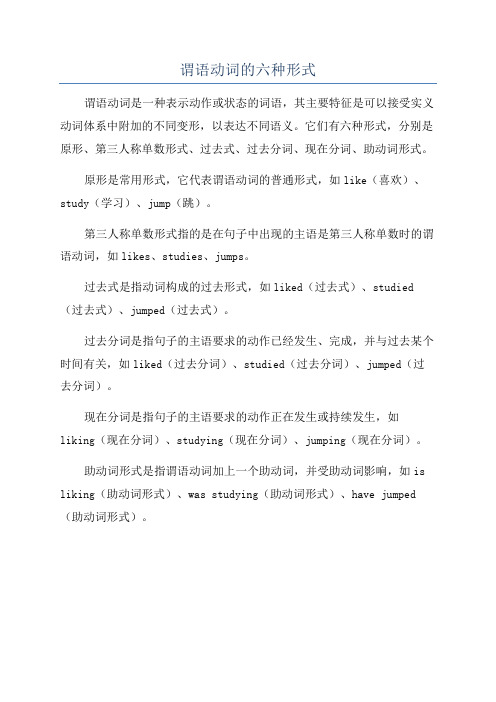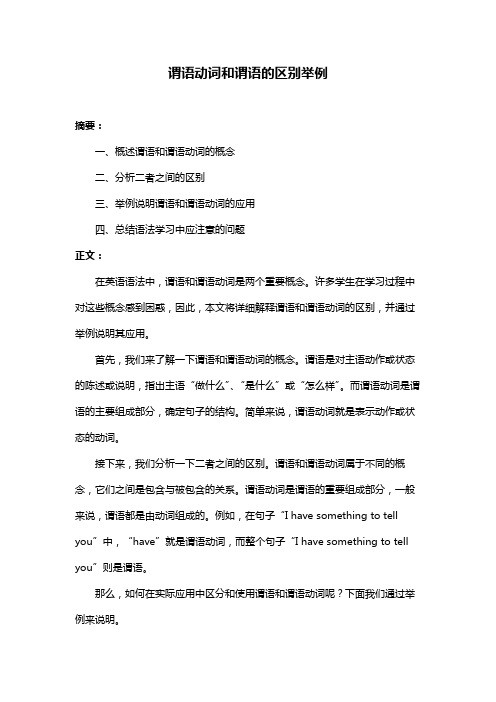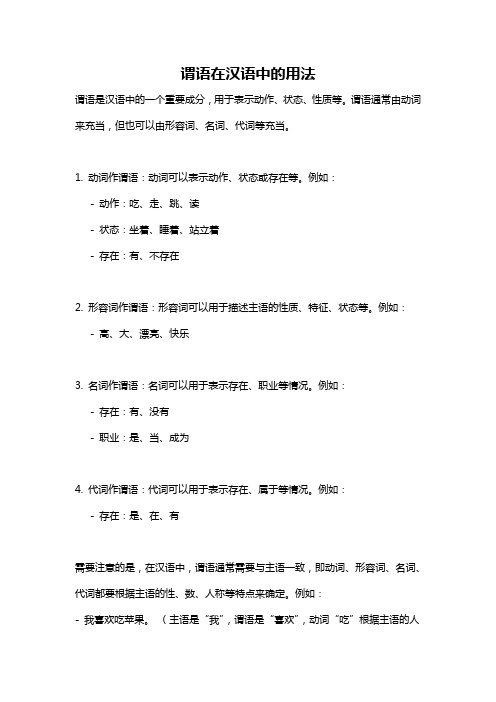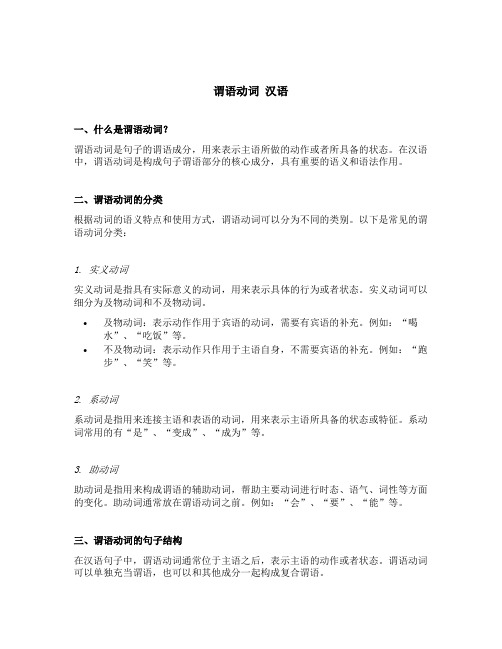谓语动词
谓语动词的六种形式

谓语动词的六种形式
谓语动词是一种表示动作或状态的词语,其主要特征是可以接受实义动词体系中附加的不同变形,以表达不同语义。
它们有六种形式,分别是原形、第三人称单数形式、过去式、过去分词、现在分词、助动词形式。
原形是常用形式,它代表谓语动词的普通形式,如like(喜欢)、study(学习)、jump(跳)。
第三人称单数形式指的是在句子中出现的主语是第三人称单数时的谓语动词,如likes、studies、jumps。
过去式是指动词构成的过去形式,如liked(过去式)、studied (过去式)、jumped(过去式)。
过去分词是指句子的主语要求的动作已经发生、完成,并与过去某个时间有关,如liked(过去分词)、studied(过去分词)、jumped(过去分词)。
现在分词是指句子的主语要求的动作正在发生或持续发生,如
liking(现在分词)、studying(现在分词)、jumping(现在分词)。
助动词形式是指谓语动词加上一个助动词,并受助动词影响,如is liking(助动词形式)、was studying(助动词形式)、have jumped (助动词形式)。
谓语动词和谓语的区别举例

谓语动词和谓语的区别举例摘要:一、概述谓语和谓语动词的概念二、分析二者之间的区别三、举例说明谓语和谓语动词的应用四、总结语法学习中应注意的问题正文:在英语语法中,谓语和谓语动词是两个重要概念。
许多学生在学习过程中对这些概念感到困惑,因此,本文将详细解释谓语和谓语动词的区别,并通过举例说明其应用。
首先,我们来了解一下谓语和谓语动词的概念。
谓语是对主语动作或状态的陈述或说明,指出主语“做什么”、“是什么”或“怎么样”。
而谓语动词是谓语的主要组成部分,确定句子的结构。
简单来说,谓语动词就是表示动作或状态的动词。
接下来,我们分析一下二者之间的区别。
谓语和谓语动词属于不同的概念,它们之间是包含与被包含的关系。
谓语动词是谓语的重要组成部分,一般来说,谓语都是由动词组成的。
例如,在句子“I have something to tell you”中,“have”就是谓语动词,而整个句子“I have somet hing to tell you”则是谓语。
那么,如何在实际应用中区分和使用谓语和谓语动词呢?下面我们通过举例来说明。
1.在句子“She is reading a book.”中,谓语是“is”,谓语动词是“reading”。
这里,“is”表示状态,是系动词;“reading”表示动作,是动词。
2.在句子“He didn"t go to the party.”中,谓语是“didn"t go”,谓语动词是“go”。
这里,“didn"t”是助动词,表示否定;“go”是动词,表示动作。
通过以上例子,我们可以看出,在英语语法中,谓语和谓语动词的区别在于它们在句子中的角色和功能。
谓语是对主语动作或状态的陈述,而谓语动词则是谓语的主要组成部分,表示动作或状态。
最后,我们要注意在学习和应用语法时,要熟练掌握谓语和谓语动词的概念、区别和用法。
这有助于我们更好地构建句子,提高英语表达能力。
在学习过程中,可以通过多练习、多分析句子,逐步提高对谓语和谓语动词的理解和运用。
谓语动词的分类(一)

谓语动词的分类(一)谓语动词的分类在语法学里,谓语动词是句子中的一个重要成分,用来表达动作、状态或存在等等。
根据不同的特点,谓语动词可以被分为以下几类:1. 实义动词实义动词是指能够独立存在并有具体意义的动词,它们通常描述某种动作或状态。
例子:•跑:小明跑了十公里。
•吃:我正在吃一块苹果。
•看:他正在看电影。
2. 系动词系动词是指用来表达主语状态、属性或特征的动词,它们不表示具体的动作。
例子:•是:他是一名医生。
•变成:这个房间变成了一个图书馆。
•感觉:我感觉很累。
3. 助动词助动词是指用来帮助实义动词或系动词表达时态、语态、情态等语法意义的动词。
例子:•会:明天我会去北京。
•能:她能唱一首歌。
•必须:你必须完成作业。
4. 情态动词情态动词是表示说话人对某个动作或状态的态度、意愿、能力等情绪的动词。
例子:•会:我会做菜。
•应该:你应该早点休息。
5. 不及物动词不及物动词是指不需要宾语就能表达完整意义的动词。
例子:•睡觉:他每天晚上都睡觉。
•站立:他站立在门口。
6. 及物动词及物动词是指需要宾语才能表达完整意义的动词。
例子:•喝水:我喝水。
•写信:他写了一封信。
7. 直接引语动词直接引语动词是指用于引述别人的话或思想的动词。
例子:•说:小明说:“我喜欢这个游戏。
”8. 间接引语动词间接引语动词是指用于引述别人的话或思想,并加以转述的动词。
例子:•告诉:他告诉我他要去旅行。
这些是谓语动词的一些主要分类。
通过了解不同类型的谓语动词,可以更好地理解句子的结构和语义。
谓语在汉语中的用法

谓语在汉语中的用法
谓语是汉语中的一个重要成分,用于表示动作、状态、性质等。
谓语通常由动词来充当,但也可以由形容词、名词、代词等充当。
1. 动词作谓语:动词可以表示动作、状态或存在等。
例如:
- 动作:吃、走、跳、读
- 状态:坐着、睡着、站立着
- 存在:有、不存在
2. 形容词作谓语:形容词可以用于描述主语的性质、特征、状态等。
例如:
- 高、大、漂亮、快乐
3. 名词作谓语:名词可以用于表示存在、职业等情况。
例如:
- 存在:有、没有
- 职业:是、当、成为
4. 代词作谓语:代词可以用于表示存在、属于等情况。
例如:
- 存在:是、在、有
需要注意的是,在汉语中,谓语通常需要与主语一致,即动词、形容词、名词、代词都要根据主语的性、数、人称等特点来确定。
例如:
- 我喜欢吃苹果。
(主语是“我”,谓语是“喜欢”,动词“吃”根据主语的人
称确定为第一人称单数。
)
- 他们都很高。
(主语是“他们”,谓语是“很高”,形容词“高”根据主语的复数确定。
)。
什么叫谓语动词和非谓语

什么叫谓语动词和非谓语【谓语动词】指的是在句子中可以单独作谓语的动词,主要由实意动词充当。
另外,be动词和某些动词短语也可以是谓语动词。
助动词,情态动词不能单独作谓语,只能协助主要动词一起构成谓语动词,因此不在谓语动词的范畴。
【非谓语动词】是指在句子中不是谓语的动词,主要包括不定式、动名词和分词(现在分词和过去分词),即动词的非谓语形式。
非谓语动词除了不能独立作谓语外,可以承担句子的其他成分。
【谓语动词】与【非谓语动词】区别1)谓语动词在句中可单独作谓语,而非谓语动词不能单独作谓语。
MissMaryteachesusEnglish.玛丽教我们英语。
(teaches动词作谓语)Mr.Victorcametoourclassroomtohaveatalkwithuslastweek.维克托先生上周来我们教室和我们谈话。
(tohaveatalk....不定式作目的状语)2)谓语动词受主语的人称和数的限制,而非谓语动词形式没有这种限制。
Larkelikesthepopmusic.拉克喜欢流行音乐。
(动词用单数第三人称形式,作谓语)Larkehasnothingtodotoday.拉克今天没什么事要做。
(do用原形,补充说明nothing)非谓语动词的特征1如果非谓语动词是及物动词,后面须跟宾语。
StudyingEnglishismyfavorite.学习英语是我的爱好。
(studying后跟宾语)Tohelphimismyduty.帮助他是我的责任。
(help后跟宾语)2非谓语动词可以带有自己的状语或逻辑主语。
Workingundersuchaconditionisterrible.在这样的环境下工作太可怕了。
(undersuchacondition是working的状语)It'stoodifficultforhimtomasterEnglishinsuchashorttime.(forhim作不定式的逻辑主语)他在这么短的时间内掌握英语太难了。
在英语中什么是谓语动词基础知识

在英语中什么是谓语动词基础知识谓语是英语句子中的重要成分,其表达往往很复杂,尤其是状态性谓语。
下面是店铺整理的在英语中什么是谓语,欢迎阅读。
在英语中什么是谓语谓语是对主语动作或状态的陈述或说明,指出“做什么”do what,“是什么”what is this或是“怎么样”how.谓语动词的位置一般在主语之后,经常用动词和形容词搭配然后用来充当谓语动词。
英语谓语动词基础知识一、动词的分类及非谓语动词简介:1)动词是表示主语做什么(行为动词)或是表示主语是什么或怎么样的词。
(行为动词) (表示主语的状态)2)根据其在句中的功能,动词可分为四类,分别是实义动词、系动词、助动词、情态动词。
说明:有些情况下,有些动词是兼类词,例如:We are having a meeting. 我们正在开会。
(having是实义动词。
) He has gone to New York. 他已去纽约。
(has是助动词。
)3) 动词根据其后是否带有宾语,可分为两类,分别是:及物动词,不及物动词分别缩写形式分别为vt. 和vi.。
4) 按动词的形式可分为谓语动词和非谓语动词。
a)谓语动词即能做谓语动词的动词。
例非谓语动词即不能做谓语的动词,但它具有动词的一些特征。
例:He likes reading . / theb)谓语动词有行为动词,系动词,情态动词和助动词,行为动词包括及物动词和不及物动词。
非谓语动词有着动词不定式,动名词,现在分词和过去分词。
二、探究释疑(一、) 分清及物,不及物动词:a.主要用作及物动词。
及物动词后面必须跟宾语。
可以用于:"主+谓+宾";"主+谓+双宾";"主+谓+宾+宾补"结构。
如:He reached Paris the day before yesterday.Please hand me the book over there.They asked me to go fishing with them.类似的还有:buy, catch, invent, found, like, observe, offer, prevent, promise, raise, find, forget, receive, regard, see, say, seat, supply, select, suppose, show, make, take, tell....b.主要用作不及物的动词。
谓语动词

谓语动词谓语动词是表示动作或状态的,它又可分为:行为动词、连系动词、情态动词、和助动词四种。
1.行为动词行为动词也叫实义动词,有完整的词义,能独立做谓语。
根据是否需要宾语,行为动词又分为及物动词和不及物动词。
(1)及物动词:要求后面接宾语,可以用于被动语态。
I fully appreciate your generosity .我非常感谢你的慷慨大方。
He is respected by everyone in the community .他受到社区里每个人的尊重。
I see an opportunity in every challenge .在每一次挑战中我都会看到机会。
Life has its ups and downs .人生有起有落。
(2)不及物动词:不要求后面接宾语,不能用于被动语态。
He never works hard .他从不努力工作。
Her plan has changed 他的计划已经改变了。
Your words and action must match .言行必须一致。
When people bagin to trust you ,your level of influence increases .当人们开始信任你时,你的影响度就提高了。
(3)有些动词可以做及物动词,后面接宾语;也可做不及物动词,后面不接宾语。
Change your way of thinking if necessary .必要时要改变你的思维方式。
We must always change .我们必须一直改变着。
God helps those who help themselves .天助自助者。
Is there anything I can do to help ?有没有什么事让我帮助?2.连系动词连系动词词义不完整,必须和其后的表语一起构成系表结构做谓语。
和连系动词一起构成的常用的语法结构(系表结构)有:(1)连系动词+形容词(这种结构最多)。
谓语动词 汉语

谓语动词汉语一、什么是谓语动词?谓语动词是句子的谓语成分,用来表示主语所做的动作或者所具备的状态。
在汉语中,谓语动词是构成句子谓语部分的核心成分,具有重要的语义和语法作用。
二、谓语动词的分类根据动词的语义特点和使用方式,谓语动词可以分为不同的类别。
以下是常见的谓语动词分类:1. 实义动词实义动词是指具有实际意义的动词,用来表示具体的行为或者状态。
实义动词可以细分为及物动词和不及物动词。
•及物动词:表示动作作用于宾语的动词,需要有宾语的补充。
例如:“喝水”、“吃饭”等。
•不及物动词:表示动作只作用于主语自身,不需要宾语的补充。
例如:“跑步”、“笑”等。
2. 系动词系动词是指用来连接主语和表语的动词,用来表示主语所具备的状态或特征。
系动词常用的有“是”、“变成”、“成为”等。
3. 助动词助动词是指用来构成谓语的辅助动词,帮助主要动词进行时态、语气、词性等方面的变化。
助动词通常放在谓语动词之前。
例如:“会”、“要”、“能”等。
三、谓语动词的句子结构在汉语句子中,谓语动词通常位于主语之后,表示主语的动作或者状态。
谓语动词可以单独充当谓语,也可以和其他成分一起构成复合谓语。
1. 单个谓语动词作为谓语当句子中只有一个谓语动词时,它充当主谓结构的核心,表示主语的动作或者状态。
例如:“我吃饭。
”、“他跑步。
”等。
2. 复合谓语复合谓语是由谓语动词和其他词语组成的谓语结构。
常见的复合谓语结构有动宾结构、状语结构、补语结构等。
•动宾结构:由及物动词和宾语构成,用来表示动作作用于宾语的关系。
例如:“我喝水。
”、“他看书。
”等。
•状语结构:由谓语动词和状语构成,用来表示主语的动作或者状态的具体情况。
例如:“我慢慢地跑。
”、“他高兴地笑。
”等。
•补语结构:由谓语动词和补语构成,用来补充说明主语的属性或者状态。
例如:“他是医生。
”、“我成为了学生。
”等。
四、谓语动词的语气和时态谓语动词在句子中不仅具有语义作用,还可以通过语气和时态来表达不同的信息。
- 1、下载文档前请自行甄别文档内容的完整性,平台不提供额外的编辑、内容补充、找答案等附加服务。
- 2、"仅部分预览"的文档,不可在线预览部分如存在完整性等问题,可反馈申请退款(可完整预览的文档不适用该条件!)。
- 3、如文档侵犯您的权益,请联系客服反馈,我们会尽快为您处理(人工客服工作时间:9:00-18:30)。
最后冲刺:谓语动词谓语动词用复数的情况谓语动词用复数的情况1) both, some, few, many等用作主语或修饰主语时,谓语动词用复数。
【例如】Both of my parents are over seventy years old.Many students in my class have creative thoughts and wide knowledge.2)“the +形容词”作主语,在表示一类人或事物时,谓语动词用复数。
【例如】The aged are well taken care of by the government.The poor are often looked down upon by the rich.The young have respect for the old in China.3) a number of, a lot of, any of, most of, the rest of, some of, none of, all of修饰复数名词时,谓语动词用复数。
【例如】Most of the teachers are responsible and knowledgeable.A number of books have been published on the subject.None of the books attract me a lot. the number of表示“……的数量”,谓语动词用单数。
【例如】The number of books published on this subject is simply amazing.The number of foreign visitors to China has been increasing over the last several years.4)集合名词作主语时,当名词表示整体时,谓语动词用单数;当名词强调集体中的个体时,谓语动词用复数。
【例如】The family is the basic unit of society. The family have agreed among themselves to spend their vocation in Europe.谓语动词常用单数的情况1)名词性从句及不定式、动名词作主语时,谓语动词一般用单数形式。
【例如】To finish the work in advance is what he wants.Smoking cigarettes is dangerous to your healthWhat seems easy in theory is difficult in practice.What caused the accident is a complete mystery.但是,what引导名词从句作主语时,其表语是复数形式时,系动词也可以是复数形式。
【例如】What we badly need here are qualified teachers.2)当主语是单数,后面跟着由including, with, together with, along with, like, in addition to, as well as, rather than, but, except, more than, accompanied by等连接的短语时,谓语动词用单数。
【例如】Mary as well as her sister likes listening to music.Doctor Richards, together with his wife and three children, is to arrive on the afternoon flight.My best friend rather than anyone else has got the first prize in the speech contest.3) one, one of, every, everyone, everybody, each, many a, either, neither, no one, nobody, anyone, anybody, someone, somebody用作主语或修饰主语时,谓语动词用单数形式。
【例如】Each man, woman and child has the same right.Many a student doesn't like to do their homework.(many a student=many students)Either of students is going to compete for the president of the students' union.More than one person was involved in the case.Neither of the young men who had applied for a position in the university ____. A) has been acceptedB) have been acceptedC) was acceptedD) were acceptedneither用作主语或修饰主语时,谓语动词用单数形式。
此外,定语从句用过去完成时,主句应用一般过去时,故答案为C。
4) and所连接的两个单数名词作主语,指同一人、同一件事或同一概念时,其谓语动词用单数。
例如:My best friend and adviser has changed his mind again.Bread, butter and eggs is typical American Breakfast .If law andsgroupsis not preserved, neither the citizen nor his property is safe.如果不能维持治安,公民和他的财产都不安全。
5)表示时间、距离、重量、体积、金钱的复数名词,作主语时作为整体来看待,谓语动词通常用单数。
【例如】Five thousands dollars is quite a large sum of money to me.Fifty miles is too long a distance for one to walk on foot.Ten years has passed but he didn't change at all.6)“a portion of , a series of, a kind of, a body of, a species of, a pair of+名词”作主语时,其谓语动词一般用单数形式。
【例如】A series of accidents has occurred recently in America.A pair of new glasses is quite expensive.7)事件、机构、国名、作品等专有名词作主语时,谓语动词用单数。
【例如】The Adventures of Huckleberry Finn was written by Mark Twain and it is an interesting book.The United Nations is an organization to defend world peace.关系从句中的谓语动词在“one of +名词(复数)+关系从句”中的单复数在“one of+名词(复数)+关系从句”中,关系从句中的谓语动词常采用复数形式。
【例如】She is one of the students who have passed Band Six.This is one of the best books that have been published recently.one之前有the only等修饰语时从句动词要用单数。
【例如】She is the only one of the girls who is chosen as the member of student union.He was the only one of the boys who was given a prize.1)并列谓语的时态一致。
【例如】Yesterday I went shopping, bought some books and had dinner at a good restaurant.The soldier looked at him, exchanged glances with his comrade and took out the gun.2)主从复合句的时态一致。
a)主句为现在时、将来时、现在完成时,宾语从句谓语动词时态按情况而定。
【例如】I wonder what will happen tomorrow.I wonder what happened to him yesterday.I wonder what is happening now outside.b)主句为过去时态,宾语从句一般用过去时态。
如果宾语从句说明的是客观真理,用一般现在时。
【例如】He told me he made a big mistake.He told me he would go to Beijing the next day.He told he had finished his task.The teacher told students that the earth moves around the sun.(客观真理)3)定语从句和比较状语从句时态不受主句影响。
【例如】The universityswhereshe is studying was founded in 1950.You now speak English better than you spoke it last year.4)时间和条件状语从句中,常用现在时表示将来。
【例如】We will cancel our trip if it rains tomorrow.I will go to visit the Summer Palace as soon as I arrive in Beijing.练习题(159-166)1) They searched for hours, but ____be found.A) at no time could the missing bookB) nowhere could the missing bookC) nowhere the missing book couldD) at nowhere the missing book could2) ____ he ill mannered, ____the laziest and the most irresponsible creature you could ever hope to meet.A) Not only is...but he is alsoB) Not only is...but alsoC) Not only is...but also is heD) Not only...but also3) ____left unguarded.A) At no time the gateB) At no time was the gateC) At no time the gate wasD) At no time did the gate4) ____did he realize that he had made a mistake.A) Upon entering the classroomB) Only after entering the classroomC) After he had entered the classroomD) As soon as he entered the classroom5) ____ a machine been so efficient and accurate as the electronic computer.A) More than ever beforeB) Never before hasC) In the past, there never hasD) Formerly there never was6) Little ____ about him when I first met him in that company.A) have I knownB) had I knownC) do I knowD) did I know7) At no time, and under no circumstances ____ the first to use nuclear weapon.A) China will beB) will be ChinaC) will China beD) shall China be8) I didn't like our new English teacher, and ____.A) neither did my classmatesB) neither my classmates didC) my classmates don't tooD) my classmates did not also9) Only when you have acquired a good knowledge of grammar ____ fluently.A) you will writeB) can you writeC) you can writeD) you could write10) Only when David did it a second time ____.A) he realized his mistakeB) he was realizing his mistakeC) did he realize his mistakeD) he did realize his mistake11) Surroundings have changed and ____ in them.A) so have the peopleB) the people have soC) have the people soD) the people so have12) ____ dark was the night that we had to rely on our ears instead of our eyes.A) HowB) ExtremelyC) VeryD) So13) ____ that the pilot couldn't fly through it.A) The storm so severe wasB) So severe was the stormC) So the storm was severeD) Such was the storm severe14) ____, I couldn't lift the box.A) As I might tryB) As try I mightC) Try as I mightD) Try though I might15) ____ you were coming today, I'd have met you at the airport.A) Have I knownB) I have knownC) Had I knownD) I had known16) Nowhere but in China ____ the reform so clearly, which have surprised us allA) we have seenB) we soC) we must have seenD) have we seen17) By no means ____ their own language well.A) it is true that all people knowB) is it true that do all people knowC) it is that do all people knowD) is it true that all people know18) Scarcely ____ when the murderer shot him down.A) did he finish his opening addressB) he did finish his opening addressC) had he finished his opening addressD) he had finished his opening address19) Only recently ____ to deal with the problem.A) something has doneB) has something doneC) has something been doneD) something has been done20) Never before that night ____ the limit of my own power.A) had I feltB) I had feltC) did I feelD) I did feel21) No one realized ____ it was until much later.A) how serious a crimeB) what serious a crimeC) how a serious crimeD) how a crime serious22) On no condition ____ with him.A) we cannot agreeB) would we agreeC) can we agreeD) we can agree23) Factory workers have to work very hard, ____.A) farmers do soB) farmers work soC) so hard farmersD) so do farmers24) Rarely ____ such a silly thing.A) have I heard ofB) I have heard ofC) have I been heard ofD) I have been heard of25) Not until I went to America ____ what kind of a country she is.A) did I knowB) I knowC) I didn't knowD) I could know26) So instructive ____ the student wanted to see it again.A) was the filmB) it was the filmC) the film wasD) the film it was27) ____ a postgraduate, I would at least master two foreign languages.A) Should I becomeB) Were I to becomeC) Had I becomeD) I should become28) Seldom ____ any mistakes during my past five years of teaching in thisuniversity.A) would I makeB) I did makeC) should I makeD) did I make29) ____ she would have avoided the accident.A) She was more carefulB) If she was more carefulC) Had she been more carefulD) She had been more careful30) ____ forget my hometown and my happy childhood.A) Never I willB) Never will IC) Never ID) I never have倒装部分练习题(159-166)1)B 2)A 3)B 4)B 5)B6)D 7)C 8)A 9)B 10)C11)A 12)D 13)B 14)C 15)C16)D 17)D 18)C 19)C 20)A21)A 22)B 23)D 24)A 25)A26)A 27)B 28)D 29)C 30)B。
